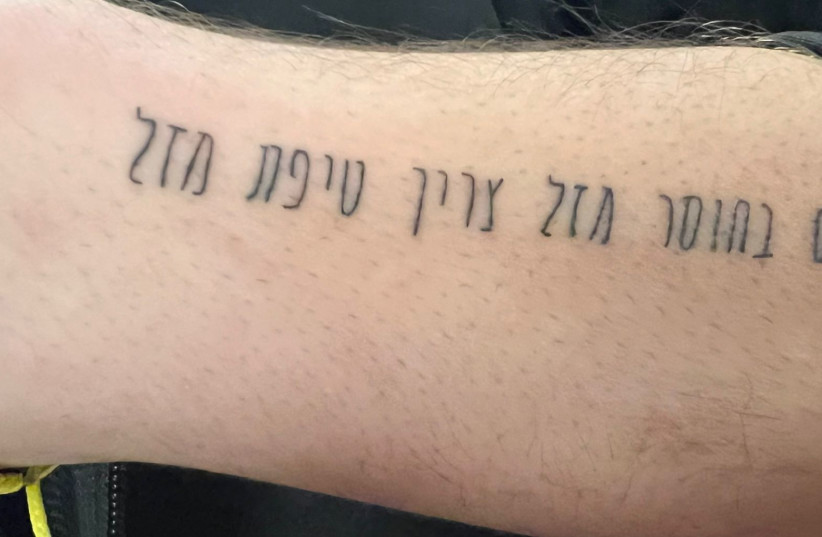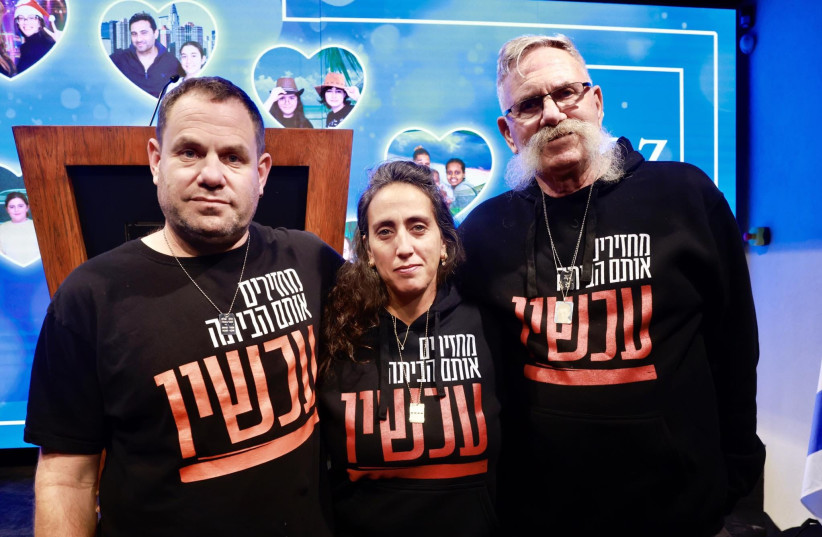"Even in misfortune, a touch of luck can make all the difference."
Ofir Engel, 18, one of the hostages freed after enduring 54 days of captivity by Hamas, permanently etched this message onto his skin over the weekend. On Monday, his grandfather, Yosef "Jucha" Engel, displayed a photo of the tattoo on his phone.
"I believe it [the saying] because Ofir said it -- he said it the day he arrived back in Israel," he told The Jerusalem Post. "Today, we know what some of the other hostages went through, and I know that Ofir was lucky."
A formidable figure with a robust build and a thick mustache, Jucha emerged as a symbol representing the relentless struggle to secure the release of the hostages in the initial month following the October 7 massacre. Even 12 days after Engel's release, Jucha confessed to enduring sleepless nights, haunted by the persistent fear of the unknown fate befalling the 137 hostages still held captive.
"I keep fighting," Jucha said. "It is for the national effort and for the father and uncle of Ofir's girlfriend, Yuval Sharabi, who remain in captivity. I cannot stop until they all come home."
Jucha met the Post at a candle-lighting ceremony at the Friends of Zion Museum in downtown Jerusalem. The event started with Hanukkah activities for more than 100 families with children from Israel's south, including from Kibbutz Be'eri.

Ofir Engel, a resident of the Jerusalem-area Kibbutz Ramat Rachel, was abducted from Be'eri on October 7 while visiting Sharabi and her family for the Simchat Torah holiday weekend. The teenager was supposed to attend the Hanukkah ceremony on Monday. However, at the last minute, he decided he wanted to be alone with his girlfriend.
"I tried to explain to him how important it is to speak out," Ofir's father, Yoav Engel, said. "But I do not want to push him too hard. He is still under tremendous stress."
Engel said that physically, his son is in good condition; however, he underwent severe psychological trauma. Ofir was subjected to manipulative messages from Hamas, falsely claiming that the country had abandoned him and that no efforts were being made for his rescue.
Ofir was forcibly taken from the safe room of his girlfriend's home while she, her mother, and sisters were enduring torture by Hamas terrorists. Throughout his 54 days of captivity, he was led to believe that his girlfriend had been murdered.
While Ofir is not allowed to share too many details about his captivity for security reasons, his father said that one thing is clear: His son was not treated well.
"Yesterday was International Human Rights Day. For 54 days, my son had no rights at all," Engel told the Post. "He could not choose what to eat, or when to eat, when to shower; he could not talk or share his opinion.
"It is absurd, but I feel lucky," he said with a shake. "I feel lucky that his head is not completely messed up. I feel lucky because, for 54 days, I saw his face at bus stations, on matchboxes, and on Soda Stream bottles. There he was on every corner. But it was only his picture. And now he is back with us in the flesh."

Engel said that people from across Israel and globally sent him messages of support during the ordeal. Now, they write to him with notes of joy. However, he emphasized that they were unprepared for having their son taken hostage, and even now, as he has regained his freedom, they grapple with the unanticipated challenges of having him home. Engel also acknowledged that they are humbled by the role he and his family aspire to play in the ongoing efforts to bring the remaining hostages back home.
"The only reason I come to events like this one," Engel said, pointing to the lovely Hanukkah festivities, "is to give the remaining hostage families strength. I want to speak out. I want to put pressure to bring them home."
Engel walked to the side of the music and clowns. He started to speak quieter.
"Do you know what the hardest part was?" he asked. "For Ofir, he worried about us. For us, we worried about Ofir. We did not know. We had no idea."
Engel said that as the days passed since his return, Ofir started to connect the dots. And he is one of the lucky ones. Many of the hostages left Gaza to find out that their brothers, sisters, and children were murdered. They lost childhood friends and neighbors.
A video capturing the moment of Ofir reuniting with Sharabi, their initial embrace, as she caught sight of him on the bed and fell to her knees in tears, circulated widely on social media. Engel remarked that the bond between them is likely to endure.
The Sharabi's are living in the Dead Sea, and the Engels in Jerusalem, but Sharabi and Ofir are always together. Ofir has yet to return to school for his senior year, and his father said he is not worried about when that will happen. Sharabi is also not in school; there is a framework for the children of Kibbutz Be;eri, he said, but it is not sufficient. And for now, they just need to return to life.
"He is a smart boy," Engel said. "We'll work it out."
But he is less confident about the country.
"We are in exile in our land"
"We are in exile in our land," Engel said. "People do not feel safe. Parents are sleeping with their children – even in Tel Aviv. We get our coffee to go. We cannot sit. There is nothing normal anymore."
He expressed outrage at the government, whose leaders expected him to thank them for securing his son's release.
"They just took his name off the list, as if he returned from his school's annual trip," Engel said in disgust. "It has been 12 days, and no one has called to check on my son.
"The country is broken and confused," he continued. "But I do not have any solutions. I am not a big military man. I am not a poltiicain. That is someone else's job."
He said he had a message for the government: No price is too high for bringing the rest of the hostages home. Engel said, "We cannot lose any chance to get them back, even if it means giving up our whole country. This is a catastrophe. Bring them home."
Jucha echoed his son.
Having previously worked closely with former Prime Minister Shimon Peres, he asserted that the government inadequately comprehends the gravity of the hostage situation. He also expressed concern that the nation is swiftly moving towards "forgetting the Holocaust that was October 7."
He said, "There is no other word than Holocaust for the torture, murder and slaughter" that took the lives of more than 1,200 people.
"If there are those who think that we will declare victory, they should think again," Jucha said. "Even if we destroy all of Hamas, we will not be able to celebrate."
